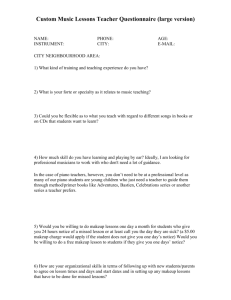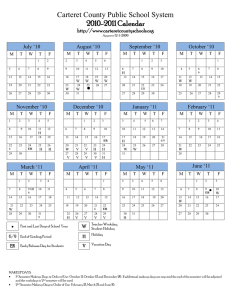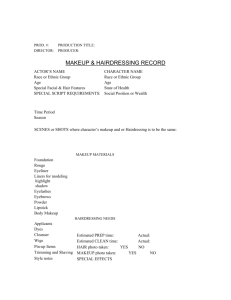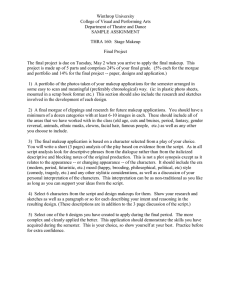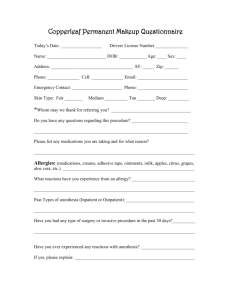R N C
advertisement
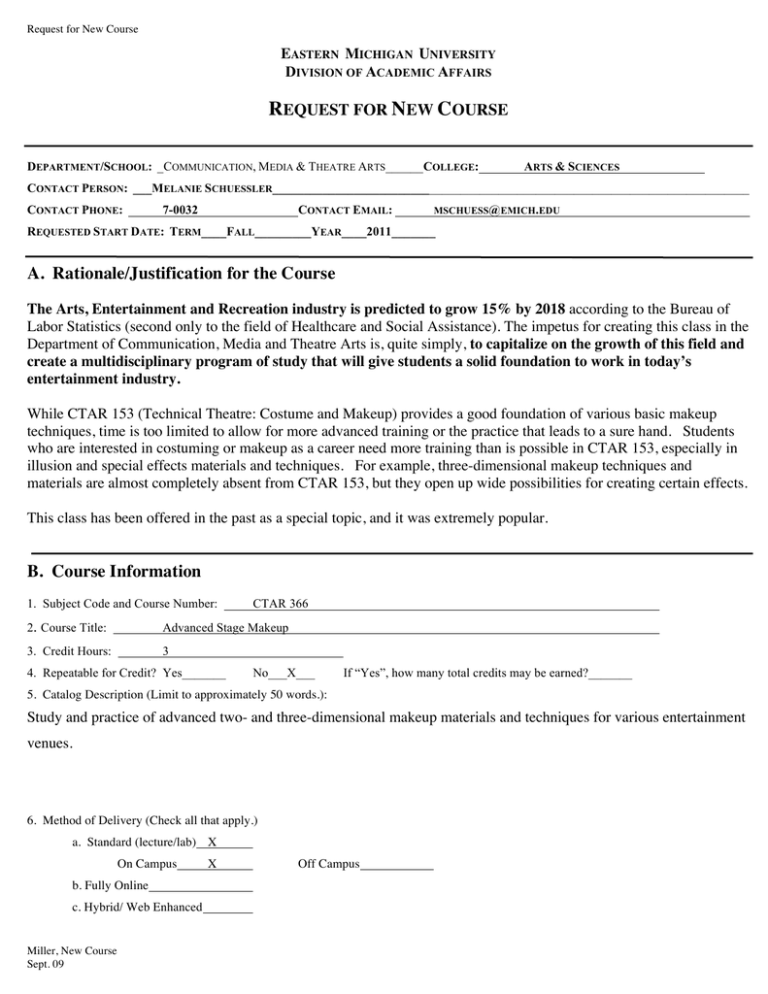
Request for New Course EASTERN MICHIGAN UNIVERSITY DIVISION OF ACADEMIC AFFAIRS REQUEST FOR NEW COURSE DEPARTMENT/SCHOOL: _COMMUNICATION, MEDIA & THEATRE ARTS______COLLEGE: ARTS & SCIENCES CONTACT PERSON: ___MELANIE SCHUESSLER____________________________________________________________________________ CONTACT PHONE: 7-0032 CONTACT EMAIL: MSCHUESS@EMICH.EDU REQUESTED START DATE: TERM____FALL_________YEAR____2011_______ A. Rationale/Justification for the Course The Arts, Entertainment and Recreation industry is predicted to grow 15% by 2018 according to the Bureau of Labor Statistics (second only to the field of Healthcare and Social Assistance). The impetus for creating this class in the Department of Communication, Media and Theatre Arts is, quite simply, to capitalize on the growth of this field and create a multidisciplinary program of study that will give students a solid foundation to work in today’s entertainment industry. While CTAR 153 (Technical Theatre: Costume and Makeup) provides a good foundation of various basic makeup techniques, time is too limited to allow for more advanced training or the practice that leads to a sure hand. Students who are interested in costuming or makeup as a career need more training than is possible in CTAR 153, especially in illusion and special effects materials and techniques. For example, three-dimensional makeup techniques and materials are almost completely absent from CTAR 153, but they open up wide possibilities for creating certain effects. This class has been offered in the past as a special topic, and it was extremely popular. B. Course Information 1. Subject Code and Course Number: CTAR 366 2. Course Title: Advanced Stage Makeup 3. Credit Hours: 3 4. Repeatable for Credit? Yes_______ No___X___ If “Yes”, how many total credits may be earned?_______ 5. Catalog Description (Limit to approximately 50 words.): Study and practice of advanced two- and three-dimensional makeup materials and techniques for various entertainment venues. 6. Method of Delivery (Check all that apply.) a. Standard (lecture/lab) X On Campus b. Fully Online c. Hybrid/ Web Enhanced Miller, New Course Sept. 09 X Off Campus New Course Form 7. Grading Mode: Normal (A-E) X Credit/No Credit 8. Prerequisites: Courses that MUST be completed before a student can take this course. (List by Subject Code, Number and Title.) CTAR 153 Technical Theatre: Costume and Makeup or permission of instructor 9. Concurrent Prerequisites: Code, Number and Title.) Courses listed in #5 that MAY also be taken at the same time as a student is taking this course. (List by Subject 10. Corequisites: Courses that MUST be taken at the same time as a student in taking this course. (List by Subject Code, Number and Title.) 11. Equivalent Courses. A student may not earn credit for both a course and its equivalent. A course will count as a repeat if an equivalent course has already been taken. (List by Subject Code, Number and Title) 12. Course Restrictions: a. Restriction by College. Is admission to a specific College Required? College of Business Yes No X College of Education Yes No X b. Restriction by Major/Program. Will only students in certain majors/programs be allowed to take this course? Yes No X If “Yes”, list the majors/programs c. Restriction by Class Level Check all those who will be allowed to take the course: Undergraduate Graduate All undergraduates____X___ All graduate students____ Freshperson Certificate Sophomore Masters Junior Specialist Senior Doctoral Second Bachelor________ UG Degree Pending_____ Post-Bac. Tchr. Cert._____ Low GPA Admit_______ Note: If this is a 400-level course to be offered for graduate credit, attach Approval Form for 400-level Course for Graduate Credit. Only “Approved for Graduate Credit” undergraduate courses may be included on graduate programs of study. Note: Only 500-level graduate courses can be taken by undergraduate students. Undergraduate students may not register for 600-level courses Miller, New Course Sept. ‘09 Page 2 of 8 New Course Form d. Restriction by Permission. Will Departmental Permission be required? Yes No (Note: Department permission requires the department to enter authorization for every student registering.) 13. Will the course be offered as part of the General Education Program? Yes No X X If “Yes”, attach Request for Inclusion of a Course in the General Education Program: Education for Participation in the Global Community form. Note: All new courses proposed for inclusion in this program will be reviewed by the General Education Advisory Committee. If this course is NOT approved for inclusion in the General Education program, will it still be offered? Yes No C. Relationship to Existing Courses Within the Department: 14. Will this course will be a requirement or restricted elective in any existing program(s)? Yes No X* If “Yes”, list the programs and attach a copy of the programs that clearly shows the place the new course will have in the curriculum. *It will be a restricted elective in the proposed “Entertainment Design and Technology” major and minor. Program Required Restricted Elective Program Required Restricted Elective 15. Will this course replace an existing course? Yes No X 16. (Complete only if the answer to #15 is “Yes.”) a. Subject Code, Number and Title of course to be replaced: b. Will the course to be replaced be deleted? Yes No 17. (Complete only if the answer #16b is “Yes.”) If the replaced course is to be deleted, it is not necessary to submit a Request for Graduate and Undergraduate Course Deletion. a. When is the last time it will be offered? Term Year b. Is the course to be deleted required by programs in other departments? Contact the Course and Program Development Office if necessary. Yes No c. If “Yes”, do the affected departments support this change? Yes No If “Yes”, attach letters of support. If “No”, attach letters from the affected department explaining the lack of support, if available. Outside the Department: The following information must be provided. Contact the Course and Program Development office for assistance if necessary. 18. Are there similar courses offered in other University Departments? If “Yes”, list courses by Subject Code, Number and Title Yes No X 19. If similar courses exist, do the departments in which they are offered support the proposed course? Yes No If “Yes”, attach letters of support from the affected departments. If “No”, attach letters from the affected department explaining the lack of support, if available. Miller, New Course Sept. ‘09 Page 3 of 8 New Course Form D. Course Requirements 20. Attach a detailed Sample Course Syllabus including: a. b. c. d. e. f. g. h. Course goals, objectives and/or student learning outcomes Outline of the content to be covered Student assignments including presentations, research papers, exams, etc. Method of evaluation Grading scale (if a graduate course, include graduate grading scale) Special requirements Bibliography, supplemental reading list Other pertinent information. NOTE: COURSES BEING PROPOSED FOR INCLUSION IN THE EDUCATION FOR PARTICIPATION IN THE GLOBAL COMMUNITY PROGRAM MUST USE THE SYLLABUS TEMPLATE PROVIDED BY THE GENERAL EDUCATION ADVISORY COMMITTEE. THE TEMPLATE IS ATTACHED TO THE REQUEST FOR INCLUSION OF A COURSE IN THE GENERAL EDUCATION PROGRAM: EDUCATION FOR PARTICIPATION IN THE GLOBAL COMMUNITY FORM. E. Cost Analysis (Complete only if the course will require additional University resources. Fill in Estimated Resources for the sponsoring department(s). Attach separate estimates for other affected departments.) Based upon current enrollment trends, our instructional resources (faculty, staff, full/part-time lecturers), equipment, and established course offering patterns are sufficient to add this course to the theatre curriculum. Estimated Resources: Year One Year Two Year Three Faculty / Staff $_________ $_________ $_________ SS&M $_________ $_________ $_________ Equipment $_________ $_________ $_________ Total $_________ $_________ $_________ F. Action of the Department/School and College 1. Department/School Vote of faculty: For _____29_____ Against _____0_____ Abstentions _____0_____ (Enter the number of votes cast in each category.) 8/21/12 Department Head/School Director Signature Date 2. College/Graduate School A. College College Dean Signature Date B. Graduate School (if Graduate Course) Miller, New Course Sept. ‘09 Page 4 of 8 New Course Form Graduate Dean Signature Date G. Approval Associate Vice-President for Academic Programming Signature Miller, New Course Sept. ‘09 Date Page 5 of 8 New Course Form Advanced Stage Makeup CTAR 366 Professor Melanie Schuessler Quirk 102 mschuess@emich.edu 487-0032 Office Hours MW 10:30-12 TTh 9-10:30 or by appointment Text and Supplies Stage Makeup by Richard Corson and Jim Glavan Ben Nye Theatrical Creme Kit (larger size, not the personal kit): You can order this online, or you can walk over to Fantasy Attic, which is in Depot Town, and buy it in person. I recommend the latter, so you can get a better color match. Fantasy Attic’s phone number is 734-4825409. Course Description In this course, you will learn the study and practice of advanced two- and three-dimensional makeup materials and techniques for various entertainment venues. Course Objectives Students will gain proficiency in the materials and techniques of stage makeup. Students will explore two-dimensional and three-dimensional techniques as well as the methods and theory of makeup analysis, research, and design. Students will be able to use these materials and techniques to create many different types of stage makeup. Assignments and Grading Each assignment has a point value; the total of all assignments added together is 1000. The total of your points at the end of the semester divided by ten will be your semester grade. Points 60 60 60 60 60 50 50 50 50 50 50 50 50 100 200 1000 points Assignment Class Participation Makeup Morgue—Old Age Makeup Morgue—Facial Hair Makeup Morgue—Wounds, Bruises, Etc. Makeup Morgue—Eyes, Noses, and Chins Light and Shadow Exercise (in-class) 2D Illusions Exercise (in-class) Texture Exercise (in-class) Old Age Makeup (in-class) Facial Hair Exercise (in-class) Wig Project (in-class) Airbrushing Exercise (in-class) 3D Makeup Exercise (in-class) Latex Prosthetic Project Final Project Paper assignments are due at the beginning of class on the due date. Makeup assignments are due at the end of class on the day of assignment. Late assignments will be worth half of their original point value if turned in within one week of due date. Assignments later than one week will not be accepted. Plagiarism and cheating of any kind will not be tolerated in this class and will result in a failing grade on the assignment in question. If you are in doubt about what constitutes plagiarism and cheating in the context of any given assignment, please do not hesitate to ask. Lateness/Absence Policy I expect you to be present and on time for this class. When you are late to class, it disrupts the class and distracts everyone, including me. I also expect basic courtesy and focus from you while you are in my class. Stay awake, turn off your phone, and take notes instead of answering your email. Miller, New Course Sept. ‘09 Page 6 of 8 New Course Form Due to the nature of the subject matter and the amount of in-class hands-on work, regular attendance is necessary for success in this class. You get two unexcused absences “free” with no penalty, though if an assignment is due that day and you turn it in late because you are absent, your assignment will be counted late (see the previous section regarding late assignments). For each unexcused absence after two, your final grade will be dropped three percent. To get credit for excused absences, you must bring documentation to the next class attended. Allowable reasons for excused absences are illness, death in the family, religious holidays, and official school functions. An explanation ↑ an excuse. Special Needs Accommodations If you wish to be accommodated for your disability, you must first register with the Students with Disabilities Office (SDO) in 240 EMU Student Center (734-487-2470), then bring SDO documentation to the professor. No retroactive accommodations are possible. Schedule WEEK 1 W 9/9 Introduction to the class read Chapter 6 for next class WEEK 2 M 9/14 Analysis and research read Chapter 7 for next class W 9/16 Makeup design read Chapters 2 and 10 for next class WEEK 3 M 9/21 Makeup basics, materials, light and shadow read Chapter 12 for next class W 9/23 Light and shadow exercises read Chapters 3 and 5 for next class WEEK 4 M 9/28 Color W 9/30 Two-dimensional illusions on the face read Chapter 11 for next class WEEK 5 M 10/5 Texture Assignment due: Makeup Morgue--Old Age read, in Chapter 13, starting with “Latex” and stopping before “Special Constructions” W 10/7 Texture WEEK 6 M 10/12 Old age W 10/14 Old age read Chapter 15 for next class WEEK 7 M 10/19 Facial hair--adding and subtracting Assignment due: Makeup Morgue—Facial Hair read Chapter 16 for next class W 10/21 Wigs WEEK 8 M 10/26 Wigs W 10/28 Wigs WEEK 9 M 11/2 Airbrushing W 11/4 Airbrushing read Chapter 13 from the beginning to the Latex section Miller, New Course Sept. ‘09 Page 7 of 8 New Course Form WEEK 10 M 11/9 Three-dimensional makeup: building from the surface Assignment due: Makeup Morgue—Wounds, Bruises, etc. W 11/11 Acne, wounds, scars, etc. read Chapter 14 for next class WEEK 11 M 11/16 Three-dimensional makeup: prosthetics W 11/18 Face casting Assignment due: Makeup Morgue—Eyes, Noses, and Chins WEEK 12 M 11/23 Modelling/molding W 11/25 Thanksgiving break--no classes WEEK 13 M 11/30 Making latex prosthetics W 12/2 Applying latex prosthetics WEEK 14 M 12/7 Latex prosthetics project workday W 12/9 Latex prosthetics project due/presentation FINAL Monday, 12/14 1:30-3pm Bibliography Aucoin, Kevin. Making Faces. Boston: Little, Brown, and Co., 1999. Corson, Richard, James Glavan, and Beverly Gore Norcross. Stage Makeup. Boston, MA: Allyn and Bacon, 2009. Davis, Gretchen and Mindy Hall. The Makeup Artist Handbook: Techniques for Film, Television, Photography, and Theatre. Boston: Focal Press/Elsevier, 2008. Debreceni, Todd. Special Effects Makeup for Stage and Screen: Making and Applying Prosthetics. Burlington, MA: Focal Press/Elsevier, 2009. Doyle, Marian I. An Illustrated History of Hairstyles, 1830-1930. Atglen, PA: Schiffer Publications, 2003. James, Thurston. The Prop Builder’s Mask-making Handbook. Cincinnati, OH: Betterway Books, 1990. -----. The Prop Builder’s Molding and Casting Handbook. Cincinnati, OH: Betterway Books, 1989. Norcross, Beverly Gore, Richard Corson, and James Glavan. Student Workbook for Stage Makeup. Boston, MA: Allyn and Bacon, 2009. Roojen, Pepin van. Hairstyles of the World. Amsterdam: The Pepin Press, 2003. Ruskai, Martha and Allison Lowery. Wig Making and Styling: A Complete Guide for Theatre and Film. Burlington, MA: Focal Press/Elsevier, 2010. Thudium, Laura. Stage Makeup: The Actor’s Step-by-Step Guide to Today’s Techniques and Materials. New York: Back Stage Books, 1999. Miller, New Course Sept. ‘09 Page 8 of 8
